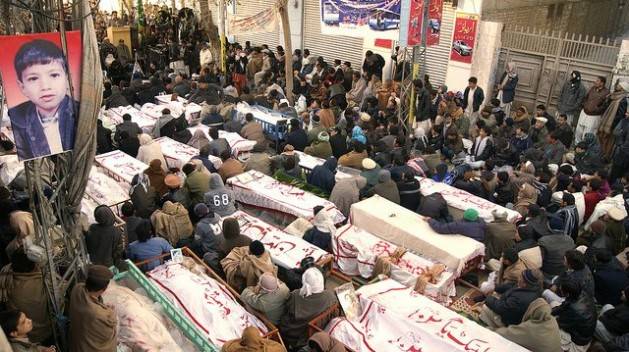
As I write these sentences, shocks from the latest attack on the Hazara community in Hazarganji, Quetta are still reverberating. Their sit-in has ended after government's assurances. We were told Prime Minister Imran Khan will finally visit them on April 18, but the visit is yet to take place.
I don’t even have to point out the difference between outrage which my fellow countrymen felt when Muslims in New Zealand were killed, and the lack thereof over the carnage which occurred at our own soil.
The level of hypocrisy is sickening and makes you realize that our own blood is perhaps considered less important. We are ready to mourn those who died thousands of miles away, and yet maintain a criminal silence, when something similar happens in our backyard.
But leave that aside, there is another disturbing trend which I have noticed on social media. Many of us, including the so-called educated, get offended when persecution of Hazara community is framed as “Hazara Genocide” or “Shia Genocide”.
The typical reactions: “Don’t call it Hazara Genocide or Shia Genocide, because in reality Pakistanis were killed”. “ It is a conspiracy to divide us into sectarian lines”. “ It is a global conspiracy to destabilize Pakistan and undermine CPEC”. “No one calls it a Sunni genocide, when Sunnis are killed in blast”.
In fact, every time an attack on minorities takes place in Pakistan, some “patriots” start objecting that we should not be calling it an attack on that minority. For example, if Christians are attacked, we should not mention the Christian identity of the victims, but say "Pakistanis are attacked". They also say that many attacks have also claimed Sunni lives, so in principle, everyone is being targeted regardless of their faith.
Their logic is that such framing damages the country’s social fabric by enhancing the existing communal and ethnic rifts. Further, many of them are adamant that there is nothing unique about killings of Hazara community as since 2001, scores of Pakistanis, including those belonging to the Sunni sect, have also been killed. Some of the more honest, admit that the Hazara community is being specifically targeted, but they see it as an international conspiracy to destabilize Pakistan by worsening law and order issue in Baluchistan.
There is a problem in this way of thinking.
Minorities when attacked, are attacked because of their identity, whether defined in terms of faith or ethnicity. Yes, some terrorist attacks are indiscriminate such as bomb blasts in crowded markets of large cities. But attacks which target minorities such as Hazaras, take place because of their faith.
Let me elucidate it further. Muslims killed in Christchurch massacre were New Zealanders. However, they were not killed because of their nationality; they were killed because of their faith. The killer actually made it clear that he was killing them because they were Muslims.
New Zealand’s Prime Minister, called those martyrs as New Zealanders and categorically said “they are us” , but also acknowledged that they were killed because of their Muslim faith. In fact, her subsequent actions of wearing hijab when meeting the aggrieved families seemed to emphasize that. Her response to the tragedy showed a lot of empathy and understanding of the way a diverse nation with multiple sub-identities should be dealt with.
In the case of Hazara, there is absolutely no doubt, that they are Pakistanis. But they are not getting butchered because of that. They are getting massacred because they are Hazara Shias. Just for the record, in the last 20 years or so, more than 100 attacks have targeted a community which is just about a million in numbers. The sheer number of attacks are disproportionate to their total share in Pakistan’s population.
Secondly, the Hazara community, which is easily identifiable due to their facial features, has been living in a confined part of the Quetta city. Those who target them are targeting them because they are specifically targeting that area.
Thirdly, those killing them have openly claimed responsibility and acknowledged that they killed them because of their faith.
Fourth, the Hazara community itself calls it targeted genocide and have constantly tried to draw attention to it, by holding prolonged protests and sit-ins, often in extreme weather conditions. Recently I had the opportunity to see a heart wrenching video, featuring some of the distinguished members of the Hazara community, drawing attention to their plight.
Yes, it is true that Pakistan has witnessed a lot of terrorist attacks, which has killed scores of Sunnis also. However, the kind of targeted attacks which the Hazara community have seen is unparalleled. By denying this, we are trivializing what in general is a slow-moving Shia genocide with particular focus on Hazara Shias as they are easily recognizable. By lumping them together with the rest, we are forgetting that Hazaras are living in a ghetto, and yet are attacked on a regular basis. We are also forgetting that CPEC is a recent development, but Hazaras have been getting killed since 1999 on a regular basis.
This is where framing becomes important. When we frame Hazara genocide as “just Pakistanis getting killed” we are denying that they are a special case and deserve much more security and protection. We are also denying that there is a problem with the way minorities are targeted in Pakistan.
Worst is that we are alienating those prosecuted minorities by doing so. This attitude is what is actually causing rifts, not that some liberals are calling Hazara genocide as genocide.
